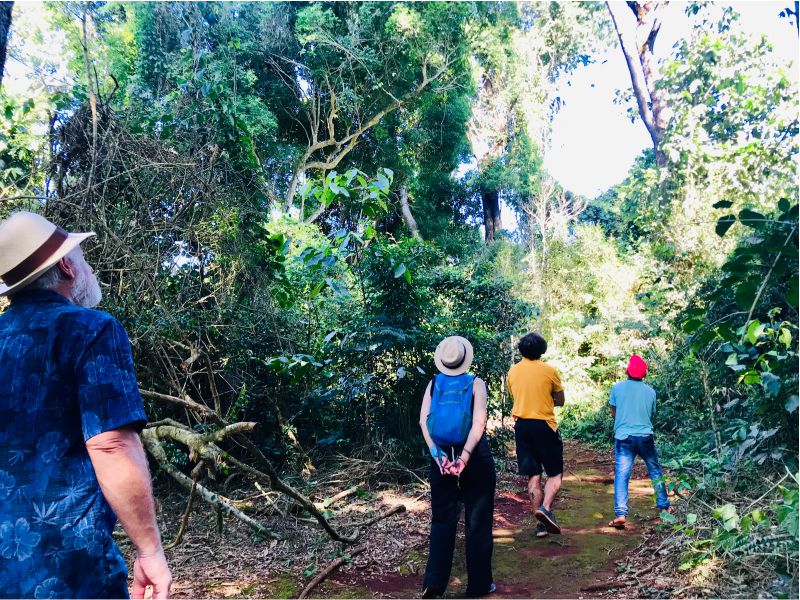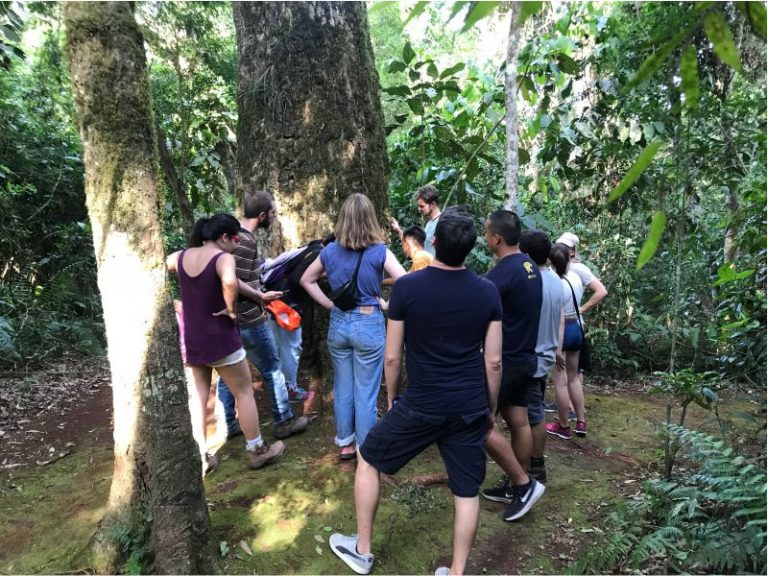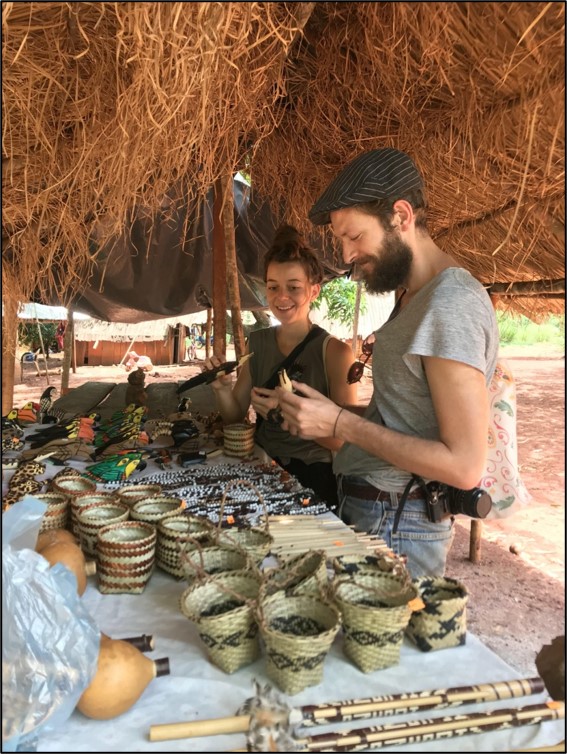The Guaraní Indigenous Tourism experience consists of a guided visit by members of the community, with a duration of approximately 2 hours. You will go through an interpretation trail, walking along the “Opy” (which is the temple where the shamans perform their rituals), and ending with the presence of a youth choir performing traditional songs. You can add to the visit, the sharing of typical meals made by the indigenous women of the community, as well as the extraction of food to make these traditional meals.
The fact that most communities are far from tourist accommodation means that the tourist has to travel to the community. This can be done in a private transfer, or on bicycles with local guides who offer the experience. And once on the tour, you can interact with nature, touch the bark of the medicinal trees, smell the aromas of the herbs, harvest manioc for the “Mandió Siriri” (traditional food), watch birds, feel the earth and “dye” your shoes with the red coloured pigment of the soil.

On the tour, the section for indigenous youth singing has a space where visitors can sit and watch the children and young people sing and perform these characteristic rhythms. They can interact with them at the end of the music.
Visiting a Mbya indigenous community, a people more than 5000 years old, is always a rich experience, a cultural exchange which implies learning their customs and traditions, their language and their cosmovision.
In an environment without intervention, and without seeking to offer a “show” or a “staged spectacle” we are in search of a genuine experience that makes for a unique aesthetic.
The combination of these characteristics makes the visit to the community a “Tourist Experience”. The possibility of getting to know an ancestral community, hand in hand with us, creates a genuine visit, interpreting nature and transmitting knowledge to the travellers, leaving a piece of our culture through our songs and typical food, making them really take away an unforgettable adventure.

Fifteen years ago, a programme called “Argentine Model for Tourism and Employment” or better known, “Project MATE” started in one of the communities of the 600ha in Puerto Iguazú. It was based on the principle that the search for the well-being of indigenous families must be accompanied by the strengthening of community life, the rescue of ancestral cultural values and the preservation of the rainforest environment, a condition without which the survival of the Ñande Rekó, the way of being and living of this ancient native nation, is unviable. Beyond the results that could be counted and made visible, we understand that there was a phenomenon that had the unexpected result of involving various indigenous Mbya-Guaraní communities in the territory of the province of Misiones, in Argentina and also in Brazil and Paraguay) in an incipient tourist activity.

There are 15 indigenous communities throughout the province of Misiones, which are already being inserted into the tourist circuits. Some are more developed, others very precarious, some receive support at some point by a national or provincial programme, others are accompanied by territorial technicians from different governmental organisations. In an environment where the socio-economic context has never favoured the living Mbya-Guaraní culture, today more than ever the crisis directly affects the hundreds of families that make up the Guaraní nation, and who are gradually being forced to give up their culture, to forget their ancestral uses and customs. Young people may not want to learn to make handicrafts because they have nowhere to sell them, so they see them as valueless; children suffer from malnutrition; and there is a lack of access to basic necessities (electricity, water, sewage, primary health care).

Against this backdrop, and paradoxically, we see that tourism is emerging as a tool that not only generates economic resources and labour, but also strengthens culture, language, uses and customs, and safeguards the ancestral culture that is gradually adapting to modernity so it does not fall into a vague memory.
For this reason, together with a group of community leaders, and accompanied by the political leaders of different communities, we proposed the Mbya in Tourism programme and implemented the current Mbya in Tourism Association.
As Santiago Martínez explains, this programme of his authorship was born from the work carried out by the Community Tourism for Local Development programme executed from 2017 to 2019, which consisted of three axes. The first was diagnosis, and prior consultation according to Convention 169: National, Regional and International. The second was the project for the creation of a school of Indigenous Tourism in the Province of Misiones. The third axis of the programme is to generate a proposal for a regulatory framework for the activity based on the principles of sustainable tourism and taking into account the experiences of other Argentine provinces and other countries that have been pioneers in Latin America and the world.
All of this will lead to the promotion and commercialisation of products through the appropriate channels at different levels.
The project is promoted by the Government of the Province of Misiones, through the Ministry of Tourism. Executed together with the NGO Travolution Latin America, specialised in the development of community-based tourism enterprises, with extensive experience at a global and regional level.
Establish Mbya in Tourism as a brand that holistically contemplates the incorporation of indigenous communities in tourism in order to complement conventional tourist circuits with a genuine proposal of indigenous tourism, with a self-management model, seeking to achieve a quality experience through the training of interpreter guides and the implementation of the regulatory framework.

ASOCIACIÓN CIVIL MBYA EN TURISMO
Personería Jurídica N° A-4877 FOLIO 70962/973
de la dirección general de personas jurídicas y registro público de la provincia de Misiones. Constituida el 03/07/2020